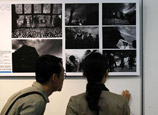
Given its large audience base, CCTV's potential for entertainment shows is vast but underestimated, say industry observers. "Dancing My Life" is the first of what is expected to be a number of reality TV shows on weekends.
In September, CCTV-1 is also considering the launch of a martial arts reality competition, "The Kung Fu of China."
Traditional Chinese kung fu from Shaolin Temple, the Wudang Kung Fu Academy and other famed martial arts institutes will showcase their diverse skills, swordsmanship and combat.
Today, most regional satellite television stations air such reality shows, usually with an interesting coaching element, not the slashing bitter comments that have characterized such programs in the past.
"The Voice of China," a reality singing contest based on the copyrighted "Voice of Holland," will launch its second season on Zhejiang Satellite TV over the summer vacation. The first season was a huge hit last year, topping the ratings with an average viewership rating of 4 percent.
According to produce Tian Ming, the show will be developed into a mature and sustainable franchise to support both domestic music and TV industries.
More untapped talents will be discovered in the new season and eight finalists will have opportunities to become contract singers with well-known music companies and release their own albums. Last year, a few top singers got increased exposure and several signed record contracts. None is professional, however, and none have shot to stardom.
Dragon TV airs two popular reality competitions, the Chinese version of "So You Think You Can Dance" (every Sunday night) and the cooking contest "Master Chef" (every Wednesday and Thursday).
In May, the channel will launch "Chinese Idol," a Chinese version of the acclaimed reality singing contest "American Idol." It will compete with Hunan Satellite TV's "China's Strongest Voice," which is based on the format of "The X Factor."
Besides, "China's Got Talent" will also return for a fifth season in November.
"The reality TV genre now plays an important role in the TV industry in terms of its popularity and diversity of styles," says Xu Xiangdong, director of the Chinese version of "So You Think You Can Dance" and "Dancing My Life."
"This fever will last for a long time internationally and also in China because these shows bring out a person's personality and can evoke intense emotions in viewers."
Purchasing successful foreign TV formats is already a trend. The shows share operational know-how and can give Chinese producers new concepts and ideas for a mature franchise and production chain.
"However, only those made with sincerity and real expertise, rather than a short-sighted profit motive, can survive the competition," Xu says.
Chen Peiying (mostly known as Xiao Chen), a celebrated local entertainment TV producer, has witnessed the development of Chinese entertainment shows over 20 years.




















![]()
